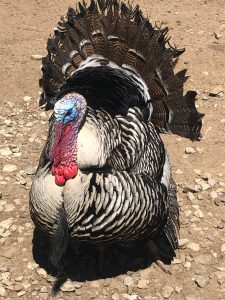
George Washington struts around us, vibrating with machismo the entire time Lisa Wyatt shows me around her animal farm.
She has 15 breeds of chickens.
Five breeds of ducks.
Four Sebastopol geese, an endangered species.
Three horses.
Two friendly goats.
And George, a Narragansett turkey looking for love.
Lisa and her husband Darrin have lived the farm life in north Knox County for five years. A Florida native, Lisa followed Darrin to Tennessee when work called him here, and told him the move would have to come with a farm and a horse.
Her life in the suburbs of Orlando had been missing the life experiences she wanted. “I wanted to be more self-sufficient,” she says. “So we got chickens and ducks for their eggs, and meat chickens to butcher. We process our own meat. We grow vegetables, and I learned to can and make bone broth. I’d love to have a cow, but I can’t talk myself into milking every day.”
Instead, she opens the doors to the barn every morning. Tends to her roughly 100 birds. Hunts for eggs, collecting between five and eight dozen in the spring and summer. Cleans up poop. Feeds and waters. Incubates eggs. Shuts the doors at dusk. She sells eggs and chicks and chickens they’ve butchered — all from her website, which she created herself. She also shares eggs with elementary school teachers whose students watch them hatch. Once they do, the teachers bring her the chicks.
Throughout the day, her ducks waddle across the street to huddle in the neighbor’s yard. One of the guineas races obsessively up and down the fence line to a pen, having forgotten it can fly. The four geese march in formation across the lawn. The goats compete for pets. The horses compete for treats. And George hopes one of us will accept his overtures. (He used to have some turkey companions before they became Thanksgiving. Now Lisa hopes that at least one of the young turkeys she’s recently acquired will be a willing companion for George.)
Is all the work and all the animals everything she hoped it would be? She sighs. “Some days,” she says. It’s a lot of work, 365 days a year. No vacations at the beach for her.
And it’s costing them money, too. “The eggs I sell pay for about half the feed I have to buy,” she says. “People who think they can save money by raising chickens instead of buying eggs at the grocery? They’re wrong. You’ll spend way more on chickens than on eggs.”
But there’s contentment on their little farm. She’s eating — and selling — delicious, nutritious eggs from chickens and ducks and guineas and quail, and she’s raising birds that can run around and eat bugs and feel the sunshine on their feathers. “We give them their very best life,” she says, “and then they have one bad day.”
